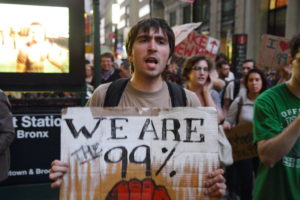What Makes Millennial Socialism Different
As writer Ben Judah argues, the Occupy movement, Jeremy Corbyn and Bernie Sanders changed this generation's thinking, and made a come-from-behind win like that of New York's Alexandria Ocasio-Cortez possible. The Occupy Wall Street movement may have planted the seeds of millennial socialism. (Kurt Christensen / CC BY-NC 2.0)
The Occupy Wall Street movement may have planted the seeds of millennial socialism. (Kurt Christensen / CC BY-NC 2.0)
The Occupy movement, British Labour leader Jeremy Corbyn and Vermont Sen. Bernie Sanders all changed what the millennial generation thinks of as socialism—and made the come-from-behind win of New York’s Alexandria Ocasio-Cortez possible. At least, that’s what Ben Judah argues in a recent piece for The American Interest, in which he outlines the many differences between the “old left” and the “new left” in the U.S. and the U.K.
One major shift on the left, Judah says, has been the coining of the terms “1 percent” and “99 percent,” which he considers one of the most powerful accomplishments of the Occupy movement, because they allowed a new kind of revolution to seep into the imagination of young Americans. A revolution of all classes uniting to fight the uber-rich, not with violence but with the power of the masses; a revolution that Sanders in the U.S. and Corbyn in the U.K. then solidified into grassroots campaigns that gave hope to a new generation of kids saddled with student debt and, soon enough, mortgages as they waded through job markets ruled by 1-percenters who not only had questionable interest in providing workers with a decent living but had politicians in their pockets and spent years eroding hard-earned labor protections.
Sanders and Corbyn, working off ideas ignited in Zuccotti Park—where the Occupy protests took place in New York City in 2011—as well as their own experiences in progressive movements and politics, essentially breathed new life into the left, according to Judah, and by doing so paved the way for young, self-proclaimed democratic socialists to win elections and send shock waves through the political establishment. In some ways, the two career progressives embody much of what new socialists believe in: that the political systems in place need not be burned to the ground but rather transformed from within, something the Vermont senator and the Islington North member of Parliament must have believed throughout their decades working as political representatives. In other words, as Judah puts it, political parties such as the British Labour Party and the American Democratic Party “can be made the vehicle(s) for the revolution [millennials] want—breaking 1 percent financial capitalism—and they can achieve it through the ballot box.”
London School of Economics professor David Graeber, one of Occupy’s organizers, tells Judah that the fact that in 2016 more Americans under the age of 30 were enthusiastic about socialism than capitalism could have emerged only from social movements. In Graeber’s words, “You won’t have seen nothing, ever, nowhere, that would have had anything positive to say about socialism on American television.”
So what exactly does millennial socialism look like if it’s so different from the leftist movements of the 20th century? Well, you’ve probably already seen it in action, though it can be hard to grasp the cohesive ideas behind it. Judah spells it out for us.
This is often the trickiest thing for liberals to grasp: for millennial socialists, America does not need a GOSPLAN, a super powerful state, or central planning. What they believe it needs is as much democracy as possible.
Workers’ control, autonomism, corporate democracy, locally supervised nationalized industries—not high-up, mandarin-allocated indicative planning. This is millennial socialism: dreams of socially-owned Ubers and AirBnBs.
You could even say this generation has absorbed part of the neoliberal critique of the state—that it is not the site of liberation—and kept something of the “think global, act local” into which the Left retreated in the 1990s. What they want is a patchwork of social enterprises, collectives, town enterprises, and union-run factories, because they reject Soviet-style centralization.
“What’s happening with people is the basic idea of democracy has changed,” says Graeber. “It no longer has just to do with the state. This is the legacy of Occupy and also seeing how social movements have played out across the world. And there has come to be the idea that you need to have institutions outside of the political structures to maintain democracy that you can integrate with those working inside the political system.”
This is because millennial socialists think in terms of a matrix of oppression.
Intersectionality has convinced this generation—feminism is socialism, anti-racism is socialism, LGBTQI is socialism. Their understanding of it is as a democratic process that reverts marginalization, through above all, voice. …
Millennial socialism is not trying to stop the market economy, but to change its players and rewrite its rules.
There you have it—progressive millennials want to seize control of powerful institutions just as their predecessors did, but their ideas of how and what to do with that power are vastly different, and, of course, could not have been conceived of without those who fought and thought before them.
Your support matters…Independent journalism is under threat and overshadowed by heavily funded mainstream media.
You can help level the playing field. Become a member.
Your tax-deductible contribution keeps us digging beneath the headlines to give you thought-provoking, investigative reporting and analysis that unearths what's really happening- without compromise.
Give today to support our courageous, independent journalists.






You need to be a supporter to comment.
There are currently no responses to this article.
Be the first to respond.